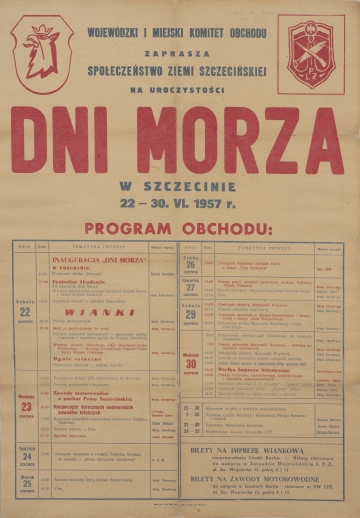
Coat hanger
1900 — 1945
National Museum in Szczecin
Part of the collection: Craft and industry products of Szczecin
At the turn of the 19th and 20th centuries, large department stores began to appear in Szczecin, offering ready-to-wear clothing produced on a mass scale at affordable prices. To promote their businesses, many shops ordered branded hangers featuring not only their name but also their address. One such department store was Lewinsky & Jacobi, founded by Louis Lewinsky and Herman Jacobi. The owners initially operated at Breitestrasse 61 (now Ks. Kardynała Wyszyńskiego Street). In 1907, a project was launched to construct a new department store on adjacent plots 62–63, to which the business was relocated. Lewinsky & Jacobi specialised in women’s and children’s clothing. Louis Lewinsky likely passed away in 1908, as the 1909 address book lists Laura Lewinsky – his wife or sister – as a co-owner. From 1910, the store belonged to Herman Jacobi, who managed it for the next 20 years. After Herman’s death, his son, Heinz Jacobi (1902–1942), took over the department store in the early 1930s. The Jacobi family, a wealthy Jewish household, lived at Dohrnstrasse 1 (now Zygmunta Starego Street). Herman and Marta Jacobi had three children: Heinz, Margarete, and Käte. The family was musically talented, and Heinz played in a string quartet. The rise of the Nazis brought a dramatic decline in the fortunes of Jewish entrepreneurs. In Szczecin, as across the Third Reich, Jewish-owned businesses were subjected to boycotts, violence, and vandalism. Heinz Jacobi’s department store was looted by NSDAP Sturmabteilung (SA) troops, and Heinz himself was brutally beaten. He was forced to transfer the store to an Aryan owner, Kurt Kitter, and fled to Berlin in 1933, where he ran the clothing company Georg Feige & Co. The Nuremberg Laws (1935) prevented him from marrying his non-Jewish fiancée. In 1938, his Berlin business was looted, and he was arrested, spending several months in Sachsenhausen concentration camp before being forced to work in a mine. In 1942, Heinz Jacobi was deported to the Trawniki labour camp near Lublin, where he died shortly after his arrival. Małgorzata Peszko
Author / creator
Object type
clothes hanger
Technique
turning (machining), bending, nadruk, manufacturing
Material
wood, metal
Origin / acquisition method
donation
Creation time / dating
Creation / finding place
Owner
The National Museum in Szczecin
Identification number
Location / status

unknown
1900 — 1945
National Museum in Szczecin

unknown
1916 — 1945
National Museum in Szczecin

Szczecińskie Zakłady Graficzne (1949-1996)
1957-06-04
National Museum in Szczecin
DISCOVER this TOPIC
National Museum in Szczecin
DISCOVER this PATH
Educational path
0/500

We use cookies to make it easier for you to use our website and for statistical purposes. You can manage cookies by changing the settings of your web browser. More information in the Privacy Policy.
We use cookies to make it easier for you to use our website and for statistical purposes. You can manage cookies by changing the settings of your web browser. More information in the Privacy Policy.
Manage cookies:
This type of cookies is necessary for the website to function. You can change your browser settings to block them, but then the website will not work properly.
WYMAGANE
They are used to measure user engagement and generate statistics about the website to better understand how it is used. If you block this type of cookies, we will not be able to collect information about the use of the website and we will not be able to monitor its performance.